Search Results
Showing results 501 to 520 of 809

Properties of Dust
Source Institutions
In this activity, learners carry out a scientific investigation of dust in their classroom. Learners produce an analysis on graph paper of the dust they collect over the course of a few days.

Water Fountain
Source Institutions
In this activity, learners explore how a hydraulic pump works. Learners work in teams to design and build a unique water fountain that employs a hydraulic pump.

Tennis Anyone?
Source Institutions
In this activity, learners explore sports engineering and advanced materials development.

Globe at Night
Source Institutions
In this international citizen science activity, learners measure their night sky brightness and submit their observations into an online database.

EEEEK--A Mouse!
Source Institutions
In this activity, learners explore the concept of how engineering solved the problem of human/computer interface.
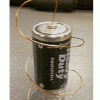
Simple Spinner
Source Institutions
In this activity, learners create a tiny electric, motorized dancer. Learners use the interactions of magnetism and electric current to make a wire spin, while displaying the Lorentz Force in action.
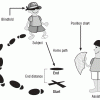
Find Your Way Around Without Visual or Sound Cues
Source Institutions
In this activity, learners play a series of simple games to investigate navigation without visual and sound cues.

Our Place in Our Galaxy
Source Institutions
In this fun and simple hands-on astronomy activity, learners construct a model of our place in the Milky Way Galaxy and the distribution of stars, with a quarter and some birdseed.

A Universe of Galaxies: How is the Universe Structured?
Source Institutions
This fun hands-on astronomy activity lets learners explore models of the Milky Way and other galaxies to get a sense of relative distances to other galaxies.

Who Dirtied The Water?
Source Institutions
In this activity, learners receive a labeled plastic film canister containing a material representing a pollutant (i.e. pencil shavings = a beaver's wood chips).

Go with the Flow
Source Institutions
In this quick and easy activity and/or demonstration, learners use two empty soda cans to illustrate Bernoulli's principle.
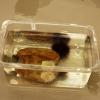
Exploration Tank
Source Institutions
This is a guide for facilitating interaction at a touch tank with marine animals. The instructions are for setting up a display in an informal science center, but could work anywhere.

Feel the Heat
Source Institutions
In this design challenge activity, learners design and build a solar hot water heater. Their goal is to create a heater that yields the highest temperature change.
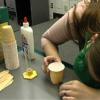
That's the Way the Ball Bounces: Level 2
Source Institutions
In this activity, learners prepare four polymer elastomers and then compare their physical properties, such as texture, color, volume, density, and bounce height.

Magnetic Lines of Force
Source Institutions
With a magnet, iron fillings, and a bottle, you can create a cool demonstration about magnetic lines of force: the fillings will arrange themselves within the magnet's magnetic field.

Afterimage
Source Institutions
In this activity about vision and optical illusions, learners conduct a simple test to demonstrate how our eyes create "afterimages." Learners stare at a black cardboard bat for at least 30 seconds an
Fish Eyes: More than Meets the Eye
Source Institutions
In this data collection and analysis activity, learners evaluate fish physiology and ecology using vision research data from Dr.

Diffusion & Osmosis with Data Analysis
Source Institutions
This three-part lab helps learners understand the essential principles governing diffusion and osmosis.

Food Forensics: A Case of Mistaken Identity
Source Institutions
This lesson is designed to serve as an introduction to the immune system. It can stand alone or it can lead into further studies of the immune system.
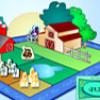
Bet the Farm
Source Institutions
This is an online game about the complexities of farming. Learners will "draw" cards and make decisions about how to take care of their farm.
